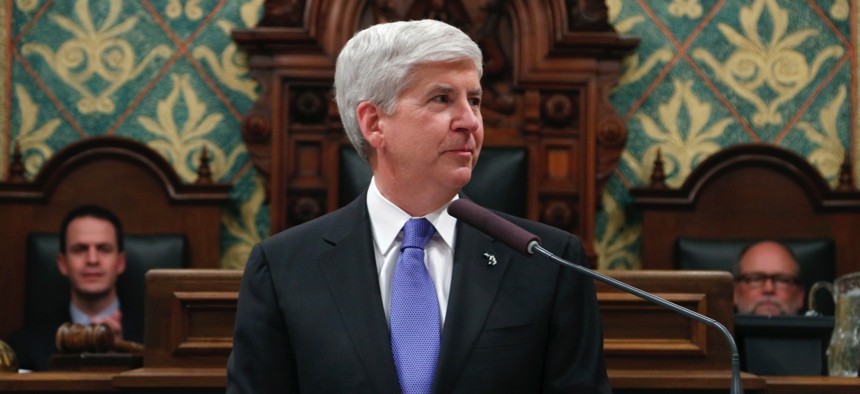Michigan Governor Signs Controversial Local Government Bill

Michigan Gov. Rick Snyder Al Goldis / AP File Photo

Connecting state and local government leaders
Rick Snyder says concerns from school districts and city halls about squelching public information on ballot initiatives are overblown but is calling on lawmakers to clarify the legislation.
Despite pushback from local government officials in his state, Michigan Gov. Rick Snyder signed a bill on Wednesday that is aimed at strengthening prohibitions on the use of taxpayer money to advocate for, or against, ballot measures.
Snyder signed the bill with the caveat that state lawmakers should work to refine language in it that has sparked worries at the local level.
Some municipal government and school district officials in Michigan were alarmed by—what they viewed—as the potential for the bill to have a variety of undesirable consequences. For instance, crimping the free speech rights of local public officials, putting public access channels at risk of breaking the law if they televised voter forums, and inhibiting the flow of basic information about ballot questions from local officials to residents.
But Snyder, a Republican, didn’t see it this way.
“As I interpret this language, it is intended to prohibit communications that are plain attempts to influence voters without using words like ‘vote for’ or ‘support,’” he said in a letter sent to state lawmakers on Wednesday, in which he explained why he signed the bill.
At the center of the controversy over the legislation is a provision that calls for penalties if local government entities, or local officials, use public funds or resources to communicate information about local ballot questions via television, radio, “mass mailing” or prerecorded telephone messages, any time during the 60-day period before a question appears on a ballot.
In order for these types of communications to violate the provision, they would also have to be “targeted to the relevant electorate” where the measure is up for a vote.
Penalties for individuals violating the provisions in the legislation include fines up to $1,000, and up to one year of jail time. If the violator is not an individual, fines could total up to $20,000, or an amount equal to the “improper contribution or expenditure.”
Among the organizations that knocked the bill were the Michigan Municipal League and the Michigan Association of School Administrators. Some of their criticisms were that the bill was poorly drafted, that groups like theirs did not have a chance to provide input to lawmakers about the legislation, and that the bill was unnecessary given existing state statutes.
The new bill aside, it is illegal under the Michigan Campaign Finance Act of 1976 to contribute or spend public money to support or oppose ballot measures.
But there is some leeway written into the act. For example, elected and appointed officials with policymaking responsibilities are able to voice their views on ballot questions, even though they receive publicly funded salaries. And it is possible for public entities to produce and disseminate “factual information” about issues tied to ballot measures.
Snyder said in his letter that the prohibitions in the legislation he signed on Wednesday, known as Senate Bill 571, were not applicable to any of the existing exceptions in current law.
“Policymaking officials still can express their own views; a public body can use its facilities to host debates or town halls on ballot questions; and local officials can express their own personal views on their own personal time,” he wrote.
But the governor also acknowledged the concerns from local governmental entities and public schools. And he called on state lawmakers “to enact new legislation to address those concerns, and clarify that the new language does not impact the expression of personal views by a public official, the use of resources or facilities in the ordinary course of business, and that it is intended only to prohibit the use of targeted, advertisement style mass communications that are reasonably interpreted as an attempt to influence the electorate using taxpayer dollars.”
Snyder said that Senate Majority Leader Arlan Meekhof and House Speaker Kevin Cotter, both Republicans, had agreed to work together to get the follow-up legislation completed before March, when elections will be held in the state.
Republicans control both chambers of the Legislature.
The Michigan Townships Association urged state lawmakers to pass the clarifying bill quickly. Executive Director Larry Merrill said in a statement issued Wednesday that the group “hopes that lawmakers reflect on the imperative of an informed citizenry for local democracy to work and immediately amend this over-reaction to a very limited number of abuses.”
Praising the governor’s decision to sign the bill was the Michigan Freedom Fund, a nonprofit advocacy group that supports limited government, and that has connections to the DeVos family, one of the two conservative families that co-founded Amway.
“Thanks to Governor Snyder and state lawmakers, taxpayers can rest a little easier today knowing government bureaucrats and lobbyists won’t be spending their tax dollars to bankroll political campaigns or push for local tax hikes,” the group’s president, Terri Reid, said in a statement. “That’s great news for families, and an important step towards better, more accountable local government across Michigan.”
Snyder noted in his letter that “there remain many other mechanisms, including private entities, associations, and political action committees to encourage support or opposition to a ballot proposal that do not rely on public resources.”
Bill Lucia is a Reporter for Government Executive’s Route Fifty.
NEXT STORY: Rainy-Day Reserves Remain Short of Pre-Recession Levels in Most State Governments





